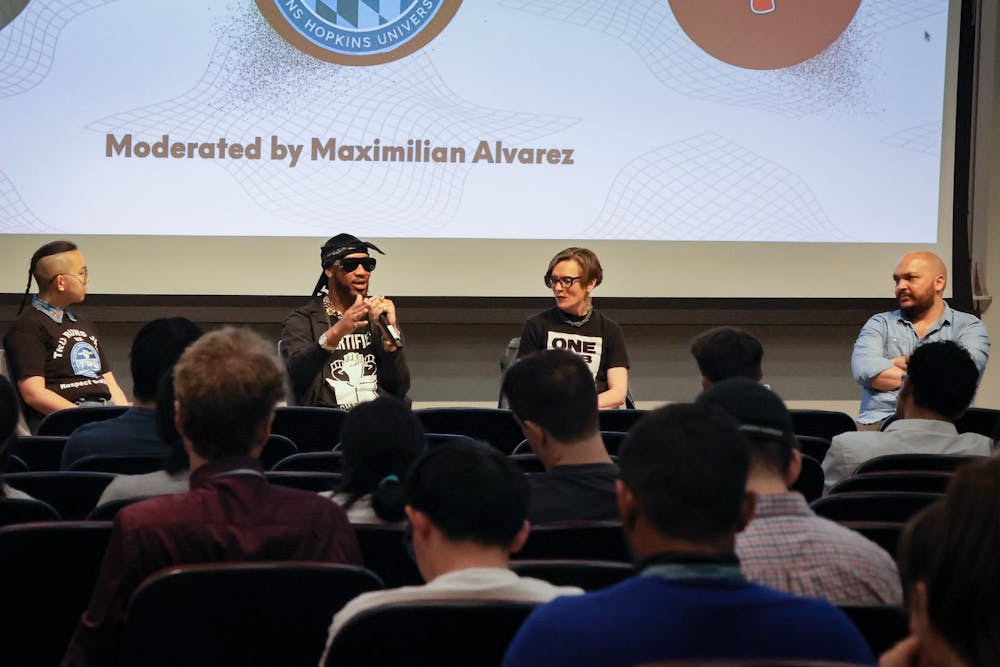The Foreign Affairs Symposium (FAS) held its last panel of the semester on the topic of workers’ rights on April 13. The panel featured Chris Smalls, the president and founder of Amazon Labor Union, Roxie Herbekian from Unite Here and Anna Word from Teachers and Researchers United, the Hopkins graduate worker union. The event was moderated by Maximillian Alvarez from The Real News Network, and speakers shared their stories on organizing and unionizing in their respective industries.
In an interview with The News-Letter, FAS Co-Executive Director Nupook Suthisamphat conveyed her insights on this year’s theme, “Paradigm Shift,” and the talk on workers’ rights.
“As a symposium, we believe that the talk itself raises awareness regarding the challenges facing workers’ rights,” she said. “As we also have representatives from JHU Dining Workers and [the Graduate] Student Union, we believe that Hopkins students can start getting involved in the fight for workers’ rights by taking the initiative to support these organizations on campus.”
She noted how the sociopolitical and economic environment presents significant hurdles for workers, particularly in terms of income inequality, which has worsened due to the pandemic.
According to Suthisamphat, the goal of the talk was to demonstrate how the pandemic has stimulated workers’ rights movements in the U.S. and around the globe, leading to better working conditions in the post-pandemic world.
Smalls opened the discussion by recounting his experience of advocating for workers' rights during the COVID-19 pandemic when Amazon neglected safety protocols. Smalls raised concerns with Human Resources but received no real solutions, so he decided to take action and organized a walkout that garnered media attention. As a result, he was fired from Amazon, and he went on to form his own organization advocating for workers' rights across different industries. Last year, Smalls formed Amazon Labor Union in JFK8, the Staten Island warehouse.
“I wasn't an organizer, wasn't seeking to organize at Amazon at all; I was just trying to do the right thing that I believed could benefit the workers,” Smalls said.
In an interview with The News-Letter, second-year PhD student María Jose Haro Sly expressed her amazement that Smalls did not come from a background of organizing.
“This is a very powerful awakening. His actions are inspiring for many workers in the U.S. to do the same,” she said. “The most impressive fact is to see PhD students from a top university learning from workers’ fights. This solidarity is very important for achieving social justice.”
The panelists emphasized the importance of unions as a tool for advocating for better wages, working conditions and protections. Herbekian highlighted the role of unions in bargaining for respect, diversity and inclusion in the workplace.
“The union is your tool to address whatever you want to address. In our union, we are proud of a lot of things, like protection regarding diversity and inclusion,” she said.
Smalls asserted that union fighting is not just for unionized workers but for all workers, as it affects the quality of life for everyone. He also pointed out the power imbalance between workers and large corporations, noting that collective action is necessary to level the playing field.
Word described how she was introduced to labor organizing through her passion for addressing the climate crisis at Hopkins.
“I heard stories about bad advisors, bad accommodations and overall environment, how grad students are not paid very well,” she said. “Once I got here, I immediately knew that I wanted to be involved in union organizing. Since then, I had the pleasure of working with people from all over the University and from other universities. I think that it’s really an uphill battle for those who want to do something.”
The discussion ended with a call to action, urging workers to remain at their jobs and organize and fight for their rights. The speakers emphasized that unionizing is a powerful tool to bring about change and improve the lives of workers.
Word explained how the climate in workspaces may create difficulties in unionizing.
“That process is very difficult, and you face a lot of things from individual people — advisors, teachers and also more system effects,“ she said. “But what helped to overcome these problems is trusting each other to work together and come up with creative and revolutionary solutions to your problems.”
In an interview with The News-Letter, sophomore Jackson Morris shared that the talk encouraged him to think more critically about workers issues in ways he had not considered before.
“I heard a variegated group of stories that all connected at one central point: the need for democratization of the workplace, where every level of worker should have some say in what that workplace looks like,” he said. “Ultimately, the creation of a union is a response to a situation in which the power over the work environment is not shared equally. It is an interesting notion to think about.”
As the labor movement gains momentum across different industries, the importance of collective action and advocating for workers' rights is being increasingly recognized.
“This is a revolution; we are in it already,” Smalls said. “It starts with us; the revolution is here.”





